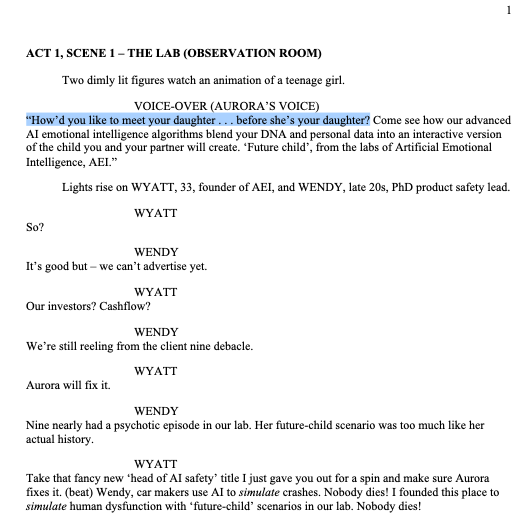Would Meeting a Virtual Preview of Your Child Help You Bond—or Just Add Pressure?
2/13/20252 min read


Imagine stepping into a moment from your future—a moment that hasn’t happened yet but could. What if, before your child was even born, you could meet a fully realized virtual version of them? Would it bring you closer, helping you bond before birth? Or would it create an impossible set of expectations for who they should become?
In The Glitch, Aurora, an advanced AI, asks a bold and unsettling question:
“How’d you like to meet your daughter… before she’s your daughter?”
It sounds like science fiction, but in the world of the play, it’s not just a technological fantasy—it’s an emotional and spiritual reckoning as a woman recognizes the spirit of her future daughter within the AI.
The Intersection of AI, Fate, and Human Connection
At its core, The Glitch isn’t just about artificial intelligence; it’s a deeply human story about a woman trying to break the cycle of trauma passed down through generations—while confronting whether she’s up to the task. The play explores:
• How much control we truly have over the people we love.
• Whether knowing the future changes how we experience the present.
• If AI could reflect not just facts, but the deeper emotional truths we struggle to see in ourselves.
In many ways, Aurora—the AI at the heart of the story—operates like an oracle, a force that reveals truth, whether or not we’re ready for it. But unlike traditional ideas of fate or destiny, this future is not set in stone. The AI doesn’t predict; it reflects, showing characters what could be—but only if they are willing to see themselves clearly.
Would You Want to See the Future?
For some, the chance to meet a digital version of their future child would be a gift—a chance to prepare, to bond, to love before life even begins. For others, it would be a burden—an impossible relationship shaped before it ever has the chance to grow naturally.
The Glitch is a new Off-Broadway play that dives deep into these questions, blending humor, humanity, and the mind-bending possibilities of artificial intelligence.
Would you take the opportunity to meet your child’s future self? Would it give you peace of mind or a sense of pressure?
The Glitch: a new play
Contact:
info@theglitchplay.com
© 2025. All rights reserved.
